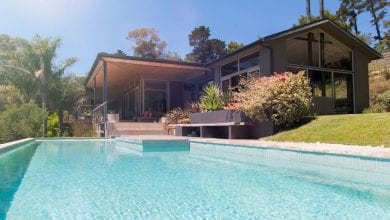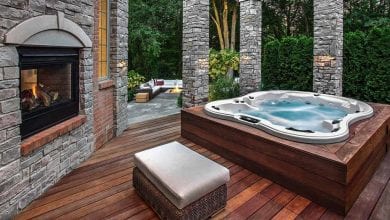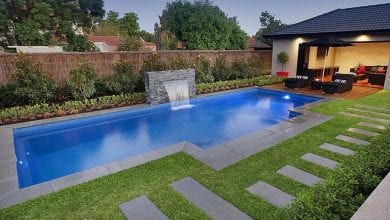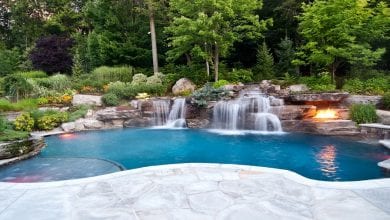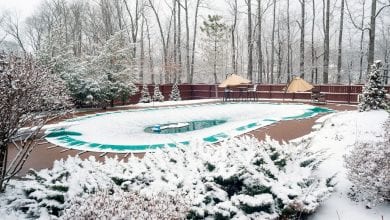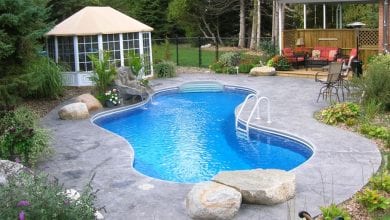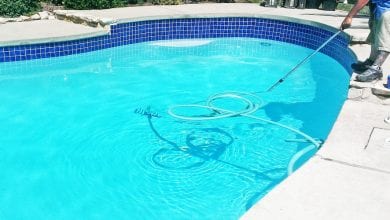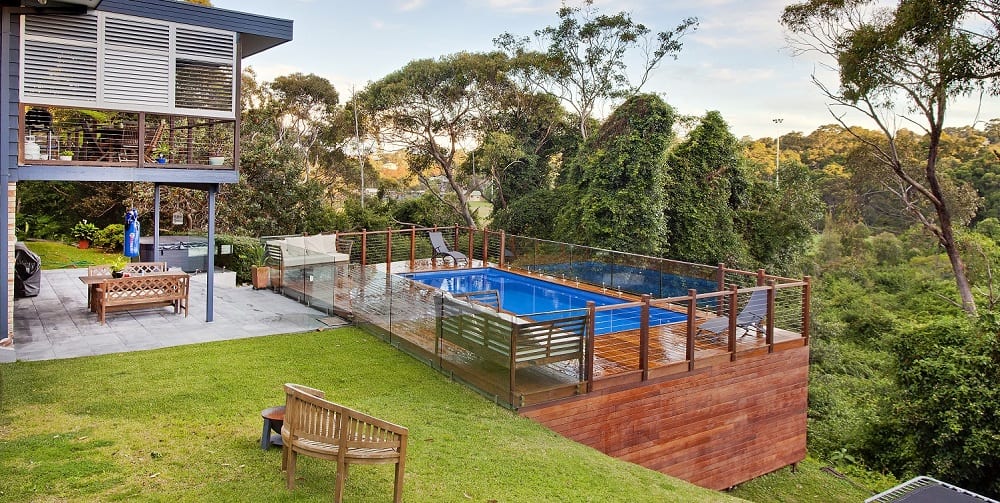
What Size Heat Pump Do I Need?
As with any working pool part, find the right product to heat the water requires some prior knowledge. Anyone asking what size heat pump do I need is heading in the right direction, especially if it has led you here! Even if you are familiar with BTUs and pool sizes, this is not a task that can be left to guesswork. Because we want you to be able to enjoy the water for as long as possible, we are going to go in-depth on all things heat pump sizes. It’ll all be worth it when you are still using your pool weeks after the neighbors have winterized theirs.
Get To Know The Basics
It’s a wasted journey when walking into the pool supply store without prior knowledge of what size heat pump you need for a pool. This is why it is important to use the same calculations as the experts. That way, you can both come to a sensible decision for a heat pump that will not only increase the temperature of the water without a struggle but also be energy efficient to keep those bills low.
Before considering which to buy, it may be a sensible idea to invest in a pool cover. This can help prevent the heat from escaping which will mean the heat pump you purchase might not need to be so powerful.
There is a lot to learn about what can influence the efficiency of a heat pump, so it is not as easy as expecting one heat pump to work within a certain amount of time. The climate and weather are major factors that we will discuss in more detail.
Sizing A Heat Pump For A Swimming Pool
The basic calculation can apply to any pool. Multiply the average depth by the surface area. This information should be in the manual of the pool but measure the surface and divide by the average depth, times by 1000L for every cubic meter.
So, for a pool that measures 16 x 32 ft with an average depth (shallow end + deep end, divided by 2) of 3 ft = 43,500L.
Then, divide this number by 2,500. The figure you get is the amount of kW you need to heat the water. So, dividing 43,500 by 2,500 gives you 17.4 kW. Because the heat ratings come in specific amounts, find one that can provide the closest number to what you need.
Other Considerations
This isn’t the same for every climate as a heat pump will have to work harder if it is to be used in a particularly cold climate. So, the calculation might need to change but finding the correct volume of the pool will go a long way when purchasing a pool heat pump.
Any area with strong winds or cold temperatures is going to mean the pump will need more kW than standard. Consider using a pool cover as well as a heat pump. Otherwise, a lot of the benefits will be escaping and the pump will have to work harder to reach the desired temperature.
How Energy Efficient Is A Heat Pump For A Pool?
This varies considerably depending on the climate. So, those living in areas that get a milder winter climate are not going to need such a powerful heat pump as those who enjoy an Indian Summer and a warmer winter. Look for the Coefficient of Performance rating (COP). This will indicate how energy efficient the product is.
However, the standards used for determining the COP is different depending on the brand and manufacturer. This makes the rating a little unreliable. Also, the climate comes into the equation again. Any product that works at a certain COP level will have to work harder, expending more energy when the temperature is low.
Testing is usually done at 80 degrees F which of course, the outside temperature does not stay at.
Should I Install The Heat Pump Myself?
If you have a background in installing these types of projects then it is possible to install the heat pump properly. However, there is something to be said for letting a professional handle the installation. This is because when installed properly, there is less risk of the pump losing efficiency.
There are stages that require expertise uncluding those with electrical hookups which can be important, not to mention dangerous.
How Often Does A Heat Pump Require Maintenance?
Routine maintenance for a pool heat pump will need to be done once a year. Checking performance and efficiency should be simple. It is also a good idea to get a professional who knows how to spot faults to take a look.
It can be useful to keep debris away from the pump so check for this when convenient. Rodents can be a problem, often making their way through the wiring so keep the housing area clear of mess and try to make it a place they would not choose to nest.
How Long Does A Pool Heat Pump Last?
As long as it has been installed properly, it should last around 5 to 10 years. This is also assuming that the yearly maintenance is carried out. Always refer back to the model’s user manual if you are unsure as this should advise the time between maintenance and how to look after it properly. Clean the cartridge regularly to make sure nothing is blocking the flow rate and it can work as efficiently as possible.
What Happens If I Buy The Wrong Size Heat Pump?
The major issue with a pool heat pump that is not the right size is that it may not be powerful enough. This means it is always going to be running at its maximum, trying to raise the temperature. Not only is this going to be pointless, but it can increase the running costs. Compared to a product that works for a few hours then switches off, it is going to make a big difference. It could also damage the unit if it is constantly struggling to raise the temperature.
On the other hand, a pump that is too big can heat the water more than it needs to which can cause other issues. This is why it is so important to get the calculations right and purchase a heat pump that is ideal for the body of water it is being used in.
Is Pool Chemical Balance Important To A Heat Pump?
Yes, it can influence the performance of the heat pump. Always stay on top of the condition of the water, maintaining the right chemical balance all year round. This is important in the summer when the UV rays are causing the chlorine to evaporate, and when the user is at its highest. However, it cannot be neglected in the winter months.
This is because pool chemicals that are out of balance can impact the working parts, particularly a pool heat pump. The lower the acidic level of thew ater, the more the pump is at risk of corrosion and other damage, the same goes for other pool parts. Use pool test kit or test strips to stay on top of the levels, or hire a maintenance team to do it for you.
How To Protect My Pool Heat Pump During Winter
This is one of the easier steps as a pool cover does an excellent job of protecting the heat pump. This can prevent debris such as leaves from building up and causing damage. Snow, hail, and a heavy downpour won’t be a problem for the heat pump with a cover.
Should I Winterize My Pool Heat Pump?
We always recommend making sure the working parts of a pool are protected for winter, including the heat pump. This is particularly important in places where ice is common as this can expand and play havoc with the pool itself, as well as other functioning parts such as the heat pump and piping.
A heat pump will be robust enough to make it through winter, but there are a couple of things to remember to winterize it. The first thing to do is remove the water from the heat exchange unit. It can be left in place which is preferable because removing and re-installing it can put it at risk of damage. During the winter months, check on the heat pump to ensure there is no debris and again, it is rodent-free.
How To Winterize A Pool Heat Pump
In just a few simple steps, you can protect the pool heat pump which will ensure it works for as long as possible, extending the time between replacements.
- Start by switching off the power to the heat pump
- Switch the circulating pump off
- Disconnect water piping
- Pull the drain plug so water is removed
- Flush water out of the heat pump using a hose, looking out for the eater exiting for around 2 minutes
- Make sure there is no water in the heat pump, following the manufacturer’s recommendations for removing it
- Reconnect the piping so and plug to ensure any remaining water can flow out and no bugs can get in
- Cover the grill to protect the unit from debris and the elements
Benefits Of Using A Pool Heat Pump
The first benefit is to the environment. There is no pollution compared to gas units and other methods. This means a large area of water can be heated without such a negative effect on the environment. Yes, they do consume energy, but not in the same way.
Another benefit is that they are easy to use. Other types of heating can require tricky installations and a connection to gas and other challenging stages for setting it up. a heat pump is one of the simpler approaches for set up, but also for using it in general.
Longevity is an overlooked benefit of a heat pump. These units tend to last a long time before they need to be replaced. Both hardy, and easy to maintain, expect to get 5 – 10 years of use before it is time to replace it. Other methods are also expensive to run, there is a lot of gas and electricity used with other forms of heating when it comes to pool ownership.
How Much Does A Pool Heat Pump Cost?
The price varies depending on powerful the unit needs to be. It is possible to pick up a standard product for a few hundred, but an efficient and more powerful heat pump is going to cost thousands. This can be more expensive than a gas heater but in the long run, the savings will be evident in the bills.
They are known for being around half the price of natural gas when it comes to ongoing running costs and a third of the price of oil.
How Long Does A Heat Pump Need To Run For?
Depending on the season, a heat pump may only need to run for a few hours a day, averaging 4 – 8 hours during the winter or any time the water dips below 60 degrees F. The price of running a pool in summer can vary as there are colder the summer, the more it is going to need to run.
The major factor for running costs and time it needs to run is always the climate. So, the corner of the world where your pool can be found is always going to influence everything from how efficient the heat pump is, how long it has to run for, how much it will cost to run, and even how long it is likely to last before needing a replacement.
Conclusion
A heat pump is an excellent choice for any pool owner looking to maintain their pool. However, it is important to get this purchase right so follow the calculations carefully and consult the user manual where possible. If you are still unsure, speak to the experts at your local supply store to give you an indication as to which product is best for your needs.

